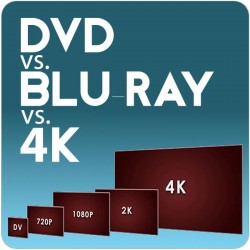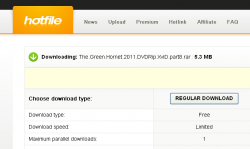Happy belated Thanksgiving. We don’t have Thanksgiving here in Australia – it’s just another Thursday for us, but as someone who has a lot of US-centric interests, it’s hard not to get caught up. Then there’s Black Friday as well. I haven’t done much shopping, if any, online this year. Traditionally, I would buy a bunch of Blu-rays at this time, but I’ve reduced my need to buy Blu-rays as a result of Netflix and Hulu Plus. This means I’m also less inclined to wait until a big sale to save a few bucks – I’m willing to pay more for the fewer discs that I deem to be collection worthy, and I actually end up watching more and spending less thanks to this system and Netflix/Hulu.
Being a public holiday in the US, news is pretty sporadic, and even if it wasn’t, I wouldn’t want to waste your time by writing a whole bunch of stuff you’re probably too drunk to read anyway.

You know it’s a slow week when you start going through someone else’s tax filings for news. To be fair, when that someone is the MPAA, even a tax filing can contain a bevy of interesting information. Such as the fact that MPAA members, the major movie studios, have upped their contribution to the MPAA for unspecified reason. That chairman Chris Dodd is paid handsomely for his political connections, at a (relatively cheap) $3.3 million per year.
There’s also a list of groups that the MPAA have issued grants to, most of then surprisingly have helped the MPAA in someway in the past, either via a study that backs one of their many assertions, or a friendly word or two in the media. Also unsurprising was the political donations the film industry’s lobby group made in 2012, to a wide spectrum of left, center and right political groups, from left-wing bleeding hearts, to Tea Party and anti-tax groups. Much like Wall Street, the politically neutrality maintained by these industry lobby groups is what makes them so powerful in Washington, with very good friends on both side of the aisle (and in the White House). That Dodd himself was a Democratic politician doesn’t really mean a thing, nor does the view regarding Hollywood’s progressive lean (which applies more to the people who work in the industry, rather than the corporate interests that govern it).

Radio doesn’t make artists a lot of money directly, so why is Spotify under attack for basically doing the same thing, but with less ads?
From the movie industry to the music industry. Musician Moby, who recently released his new album for free on BitTorrent (and included all the stems too for those interested in remixing their own stuff), has been talking about piracy, Spotify and BitTorrent, and he has some interesting things to say.
I don’t want to go over the entire interview here (you can read it here instead), but basically, Moby says that creating good music is key to getting new fans, which is then key to making money in the music business. So even if new fans are created because people have downloaded his songs illegally, Moby says that’s alright, because they will spend money down the line, whether it’s through song purchases, merchandising or even concerts. Another interesting point that Moby makes in regards to people who are not happy with Spotify’s revenue model. Moby says that the same people are complaining are the ones overjoyed at their songs being played on the Radio, even though this is just as unprofitable. In other words, Spotify is a promotional tool, like radio, and artists shouldn’t be too disheartened just because they’re not making mega-bucks from it.


Gravity is designed to be watched on a big screen in the best quality possible – piracy is not a real competitor, at least not where revenue is concerned
I finally got around to watching Gravity at the cinemas last week. That’s another thing I’ve been doing more of thanks to Netflix and the money I’ve saved from buying less Blu-rays. People can argue about the “apparent” simplistic nature of the storyline, but it was entertaining, it was well made, it broke new ground technologically and it’s the kind of film that only the cinema does justice (although I’ll definitely get it on Blu-ray as well). Anyone who loves watching movies, I think will agree that, unless you’ve go a kick-ass home theater system, there is no substitute for going to the movies, for films like this.
But the main reason I wanted to talk about Gravity is because of the new trailer I’ve just uploaded for it here. It’s not just any old trailer though, this one is a 2K one (2048×858). It won’t play on the PS3 and Xbox 360 (I know, I’ve tried), but it should work on your PC. The next small step/giant leap for our trailers section would be to make some 4K and HEVC trailers available for you all, so stay tuned.

This is starting to get a little ridiculous. If there was one thing that both the PS3 and Xbox 360 did well (with the PS3 being better) was their media capabilities. It’s not just Netflix and other apps, but just the ability to play a whole bunch of different types of media, either digital or on disc, that made these consoles the heart of your home entertainment set up. The last thing I would have expected with the so called next-gen consoles was for them to start going backwards in this area. But go backwards they did.
The PS4 can’t play CDs, MP3s and no longer works as a DLNA client. The Xbox One can’t play MP3s natively, but does at least allow them to be played via your home network. Neither supports Blu-ray 3D, which is not a huge loss, although still a surprising omission, for both Sony (them being the founding fathers of Blu-ray) and Microsoft (what with them trying to convince us of the Xbox One’s “all-in-one” credentials).

Xbox One can’t read BD-R/BD-REs. A new anti-piracy measure?
So I guess I shouldn’t be surprised at the news of the Xbox One not being able to read recordable Blu-ray discs – it fits into the theme of this generation so far in terms of media compatibility. Apparently, this has been done deliberately on the software level, possibly as a way to prevent piracy (not just movies, but also, and probably more importantly, of game discs).
The Microsoft support pages even goes as far as saying that only mastered DVDs will play, although many have since confirmed that DVD recordables do work (for now at least).
While this one definitely smells of heavy handed copy protection, the other omissions may be less about restricting user rights. To me, they feel like the result of a rushed launch, with Sony and Microsoft wanting to at least not lose to each other when it comes to the timing of the launches. The news that TV-integration on the Xbox One doesn’t work well in PAL/50Hz regions, due to the system being designed to work with US 60Hz signals, seems to confirm my suspicions that the console wasn’t quite ready for prime time.
So if you’re not in a hurry, I’d suggest you wait a couple of months at least, until both consoles have ironed their bugs and added back the necessary features, before committing.
That’s it for the week. See you again in seven.











